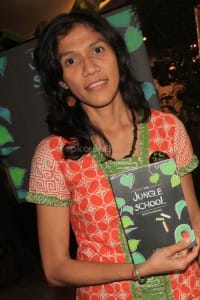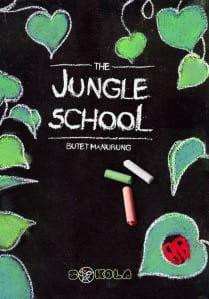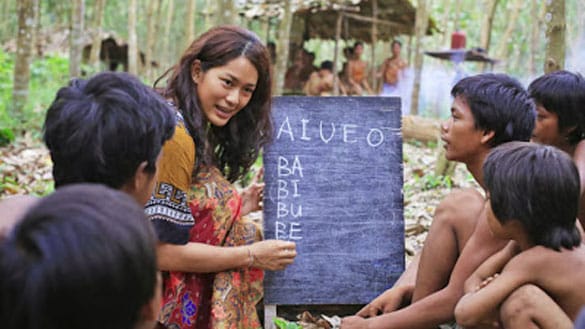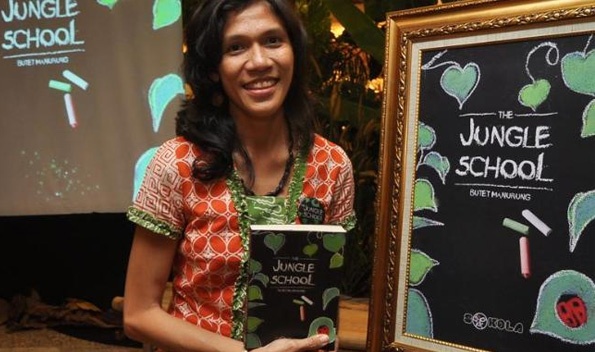Butet Manurung is widely known in both Indonesia and on the international arena for her SOKOLA initiative, otherwise known as the Jungle School. The Indonesian educator and activist won prestigious awards from UNESCO, TIME Magazine and the World Economic Forum for her community work. I caught up with Butet, in between her travels, to ask about the new film release, Sokola Rimba, which is based upon her journal notebook.
As a child, Indiana Jones and the Famous Five inspired Butet. She developed a love of the outdoors, whilst earning her degrees in anthropology and Indonesian literature from Padjadjaran University, Bandung. In 1999, Butet joined the conservation NGO, WARSI, to lead their educational program for the Orang Rimba (the People of the Forest). They are an Indigenous tribal community, living deep within the Bukit Dua Belas jungle of Jambi, Sumatra.
“I took a dream job, which involved entering the forest, to set up an education program with a remote tribe of hunter-gatherers, as part of a conservation organisation’s strategy to work with local communities,” recalled Butet. “In 2003, after four years of intensive work with forest communities, my work in the jungle evolved into co-founding SOKOLA, a non-profit organisation providing educational opportunities for more than 10,000 marginalized people.”
When the children took extra interest in Butet, she looked for opportunities to teach them to read and count. As a highly independent people, their life was very sustainable, until the modern world came along. Critical education was offered in order to assess and discuss whether some of their tradition might not be working for their daily lives anymore. They also needed to assess what parts of modern life were harmful. These community discussions occurred regularly.
“Based on my own experience, teaching in the forests of Sumatra, I have developed a completely new method that allows people from pre-literate societies to quickly learn to read and write Indonesian,” explained Butet. “As indigenous peoples, they are very special. Compared to other indigenous peoples, they are one of the most stubborn, and not easily bought by the modern world. I love them. They show me lessons in life, and they are my heroes, who feed me, teach me survival and how to protect myself from danger in the jungle.”
In order to teach the Orang Rimba how to recognize their rights as Indonesian citizens, Butet worked hard to earn the trust of the people by learning to speak the local dialects and immersing herself within the tribal lifestyle. She encouraged her students to take on challenges and defend their rights. In her book Sokola Rimba, Butet shares the journal she kept during her first year in the jungle. She tells of her adventures with stinging bees, prowling bears, and biting ants. She also describes how her relationship with the Orang Rimba developed as she slowly transformed from an outsider into a teacher within the community.
“The book explains how nomadic tribes are living today in the rainforests of Sumatra as hunter-gatherers,” said Butet. “The outside world has arrived on their doorstep, bringing challenges such as illegal loggers and palm oil plantations.”
Across Indonesia, indigenous peoples can no longer avoid contact with the outside world. Although they are often at the centre of conflicts over land, forests, and coastlines, they rarely engage in problem solving. By giving indigenous youth access to education, Butet is preparing the next generation to become a bridge between their communities and outside interference.
“Many of the government programs are designed very well and with good intentions,” Butet explained. “But without sufficient community knowledge and active participation, many of them result in failure and typically indigenous peoples are then blamed, and labelled as hopeless, wild, or impossible.”
Indigenous peoples tend to evoke two strong opposing viewpoints. Because they live in fragile ecosystems they are alternately viewed as its best defenders and worst enemies – as rightful inhabitants and dangerous encroachers. In Indonesia, the paradox extends into a moral realm. To some, indigenous peoples are symbols of pristine nature, cultural diversity, and simple living. To others they represent poverty, backwardness and an obstruction to progress.
Over the past 15 years, Butet has identified 700 communities nationwide that are facing pressure to change, yet have no educational opportunities for their young generation. Her organization has placed 18 volunteers so far. Two million people all over Indonesia are living with the same challenges facing Orang Rimba. With more SOKOLA ‘study and exposure trips’, indigenous youth now have a real opportunity for their voices to be heard in government forums.
SOKOLA has made use of the considerable media interest to help a wider public learn about these remote communities and to enable the youth themselves to voice their ideas and aspirations. The ‘Jungle School’ book has recently been adapted into a feature film by two award-winning Indonesian filmmakers.
“The film is a collective of dynamic producer-director duo, Mira Lesmana and Riri Riza. It‘s a great opportunity to support aspects of indigenous peoples, environment and education,” explains Butet. “Sokola Rimba film received the Piala Maya Award for Best Film of 2013. The DVD is released during May, and this year it will be shown in Australia as part of an Indonesian Film Festival, and it will be shown at an Environmental Film festival in Washington DC.”
Readers can volunteer at SOKOLA programmes in the four provinces of Jambi, Flores, South Sulawesi, and Papua. In each region, at least one coordinator from the SOKOLA team lives together with volunteers who are ‘recruited and trained locally’ as well as those from a national network. The schools are run using local dialects.
In the coming months, Butet will expand her work to indigenous communities in Kalimantan, in collaboration with a locally based company. Volunteers should have some field skills, a love for humanity (especially children), educator characteristics, tenacity in the field, and they must accept risks, such as malaria.
For more information contact Butet Manurung: [email protected]




